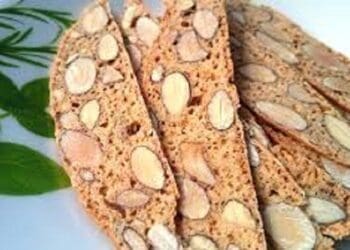Biscotti are basically long life biscuits. They have been popular since the days of Roman Legions on their travels and still today in hotels and coffee shops around the world. If you don’t like almonds, you can always substitute them with hazelnuts, pecans or walnuts. One of the benefits of these biscotti is the ability to dunk without falling apart. These are ideal for lunch boxes, picnics and children’s snacks. Not to forget those times when a mug of coffee and a biscuit are needed. This recipe produces about 40 biscuits. Obviously, there is no restriction of the flavours you can add. At the last count, there were over 40 flavours.
Biscotti, a classic Italian biscuit, traces its origins to the ancient Roman era. Derived from the Latin words “bis” (twice) and “cotto” (baked), biscotti literally means “twice baked.” This method of baking gave the biscuits their characteristic dry and crunchy texture, making them ideal for long journeys and military campaigns, as they were resistant to spoilage.
The modern biscotti, as we know it, hails from the Tuscan city of Prato. This gives rise to the name “cantucci di Prato.” In the 19th century, Italian baker Antonio Mattei redefined biscotti by introducing almonds. Since then this practice that has become a hallmark of traditional biscotti recipes. His version gained widespread popularity, establishing the treat as a staple of Italian cuisine.
Biscotti’s distinctive crunch and flavor make it an enduring favorite, especially when paired with beverages. In Italy, biscotti are often enjoyed with a glass of vin santo, a sweet dessert wine that complements the biscuit’s flavors perfectly. In other cultures, it’s common to dip biscotti into coffee, espresso, or tea, allowing the liquid to soften the biscuit slightly and enhance its taste.
Over time, biscotti has evolved beyond its traditional almond flavor. Modern variations include ingredients like chocolate, dried fruits, nuts, and even spices such as anise and cinnamon. These adaptations have made biscotti a versatile treat, suitable for different tastes and occasions.
One of biscotti’s appeals lies in its simplicity and elegance. The biscuits are typically made from basic ingredients like flour, sugar, eggs, and almonds, yet they achieve a sophisticated taste and texture through the baking process. The double-baking method involves first shaping the dough into logs and baking them until firm. Once cooled, the logs are sliced into thin pieces and baked again until crisp. This technique ensures the biscotti’s signature crunchiness.
Today, biscotti enjoys global popularity, appreciated for its storied history and timeless flavor. Whether served as a dessert, a coffee accompaniment, or a standalone snack, biscotti continues to delight and satisfy with its delightful crunch and rich heritage. Its enduring appeal is a testament to its simple yet elegant charm, making it a beloved treat across cultures and generations.

Biscotti
A divine Italian almond biscuit that is twice baked. I love dunking these in a mug of coffee.
Print
Facebook
Pinterest
Twitter
Add to Collection
Servings: 40 biscuits
Calories: 93kcal
Ingredients
- 2 1/2 cups all-purpose flour
- 1 cup sugar
- 2 large eggs free range
- 1/2 cup almonds chopped
- 1 tsp baking soda
- 1/4 tsp Salt
Instructions
- Combine all the ingredients in a mixing bowl and stir to combine.2 1/2 cups all-purpose flour, 1 cup sugar, 2 large eggs, 1/2 cup almonds, 1 tsp baking soda, 1/4 tsp Salt
- When the dough becomes too stiff to stir, work with your hands until the ingredients are thoroughly combined.
- Divide into 4 parts and roll each into a log shape about 1 inch (2.5 cm) thick.
- Place 2 logs on each of 2 baking sheets which have been covered with parchment or wax paper.
- Bake in a preheated 350F (180C) oven for about 30 minutes, until lightly browned.
- Remove from the oven and leave the oven turned on.
- Cut into 1/2 inch (1 cm) slices while still warm and return to the oven.
- Bake an additional 10 to 15 minutes, until crisp and golden brown.
- Cool completely and store in an airtight container.
- Will keep for several weeks in sealed container.
Notes
These are best dunked into a piping hot mug of coffee.
Nutrition
Calories: 93kcal | Carbohydrates: 17g | Protein: 2g | Fat: 2g | Saturated Fat: 0.2g | Polyunsaturated Fat: 0.4g | Monounsaturated Fat: 1g | Cholesterol: 11mg | Sodium: 50mg | Potassium: 45mg | Fiber: 1g | Sugar: 6g
